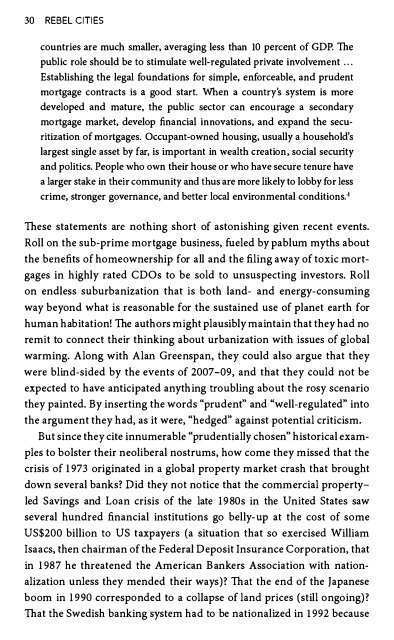Rebel Cities-David Harvey
Rebel Cities-David Harvey
Rebel Cities-David Harvey
- No tags were found...
Create successful ePaper yourself
Turn your PDF publications into a flip-book with our unique Google optimized e-Paper software.
30 REBEL CITIEScountries are much smaller, averaging less than 10 percent of GDP. Thepublic role should be to stimulate well-regulated private involvement ...Establishing the legal fo undations fo r simple, enforceable, and prudentmortgage contracts is a good start. When a country's system is moredeveloped and mature, the public sector can encourage a secondarymortgage market, develop financial innovations, and expand the securitizationof mortgages. Occupant-owned housing, usually a household'slargest single asset by far, is important in wealth creation, social securityand politics. People who own their house or who have secure tenure havea larger stake in their community and thus are more likely to lobby fo r lesscrime, stronger governance, and better local environmental conditions:'These statements arc nothing short of astonishing given recent events.Roll on the sub-prime mortgage business, fu eled by pablum myths aboutthe benefits of homcownership for all and the filing away of toxic mortgagesin highly rated CDOs to be sold to unsuspecting investors. Rollon endless suburbanization that is both land- and energy-consumingway beyond what is reasonable for the sustained use of planet earth forhuman habitation! The authors might plausibly maintain that they had noremit to connect their thinking about urbanization with issues of globalwarming. Along with Alan Greenspan, they could also argue that theywere blind-sided by the events of 2007-09, and that they could not beexpected to have anticipated anything troubling about the rosy scenariothey painted. By inserting the words "prudent" and "well-regulated" intothe argument they had, as it were, "hedged" against potential criticism.But since they cite innumerable "prudentially chosen" historical examplesto bolster their neolibcral nostrums, how come they missed that thecrisis of 1973 originated in a global property market crash that broughtdown several banks? Did they not notice that the commercial propertyledSavings and Loan crisis of the late 1980s in the United States sawseveral hundred financial institutions go belly- up at the cost of someUS$200 billion to US taxpayers (a situation that so exercised WilliamIsaacs, then chairman of the Federal Deposit Insurance Corporation, thatin 1987 he threatened the American Bankers Association with nationalizationunless they mended their ways)? That the end of the Japaneseboom in 1990 corresponded to a collapse of land prices (still ongoing)?That the Swedish banking system had to be nationalized in 1992 because


